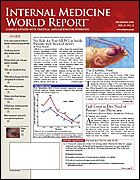Americans Confused About "Diet" Supplements
From NAASO, The Obesity SocietyWarn Patients of Bogus Weight-Loss Advertising
BOSTON?With the growing number of obese Americans who are trying to lose weight, a new survey of adults has uncovered an alarming trend, showing widespread misconceptions about the safety and regulation, or lack thereof, of dietary supplements.
Of the 1444 survey respondents who had made repeated efforts to lose weight, the following misperceptions about diet supplements (marketed as weight-loss products) were found:
? 60% thought such products have been tested
? 65% thought they were proven to be safe
? 63% thought they were proven to be effective
? 54% thought they were approved by the FDA.
IMWR
"The big surprise here is that most Americans believe that dietary supplements are tested for their safety and their effectiveness," Thomas Wadden, PhD, of the Pennsylvania School of Medicine, Philadelphia, and president of the North American Association for the Study of Obesity (NAASO), told . "The American public needs to know that these supplements are not tested for their safety and effectiveness. Most people seem to believe that since they are on the supermarket and drugstore shelves, they must be safe and effective. There is no evidence that they are."
The survey was conducted by the University of Connecticut's Center for Survey Research & Analysis, and results were presented at the NAASO, The Obesity Society meeting.
The first survey to evaluate consumer perceptions about dietary supplements for weight loss found that one third of Americans had used dietary supplements on ≥1 occasions to help them lose weight, which is double the rate in patients who have used FDA-approved prescription medications.
Currently, there are no FDA-approved over-the-counter (OTC) products for weight loss. An OTC version of the popular prescription weight-loss drug orlistat (Xenical) is now in clinical studies.
Additional survey findings included:
? Weight-loss supplements are used by a higher proportion of African Americans (49% of respondents) and Hispanics (42%) than by whites (31%)
? Only 30% of respondents said they would speak to a physician about losing weight, even though 87% of respondents have a primary care physician, and 92% see their physician at least once a year.
IMWR
"We have an epidemic of obesity, and many Americans are trying to lose weight with no guidance from a physician, and by using untested supplements rather than FDA-approved prescription drugs," coinvestigator Saul Shiffman, PhD, of the University of Pittsburgh, told.
"To help people avoid a cycle of defeat and to increase their chances for success, they need to be informed about weight-loss treatments that are proven to work to improve health and well-being," he added.
To this end, the newly formed Reality Council, which is comprised of leaders in the field of obesity and its treatment, announced at the meeting that they were spearheading an initiative aimed at identifying and attacking misleading product advertising of weight-loss supplements.
"We call for a specific and concerted effort to identify and name bogus weight-loss supplement advertising, which has a pernicious effect on the lives of people who want to lose weight and are lured into the use of these supplements," council member George Blackburn, MD, PhD, associate director of the Division of Nutrition at Harvard Medical School, told IMWR. "We also want to promote healthy weight loss and, importantly, weight control using the tools that we know work—healthy diet, exercise, and treatment with FDA-approved drugs under a doctor's guidance."
The new initiative calls upon:
? Physicians to teach patients about realistic weight-loss goals and discourage the use of untested and unproven diet products
? Regulators to enforce existing laws pertaining to products making unsubstantiated weight-loss claims
? The media to communicate the potential consequences of using unverified weight-loss products.
Richard Cleland, assistant director of the US Federal Trade Commission's Division of Advertising Practices, said that the initiative is a "very important step in addressing the obesity epidemic." He noted that there have been no unified efforts on the part of government and medical leaders to deal with weight-loss product fraud in the United States.
Key points
? Many Americans believe that OTC products are monitored by the government for their safety and efficacy.
? Educate your patients about FDA-approved drugs and other medical therapies, which are safer choices than unregulated products.
